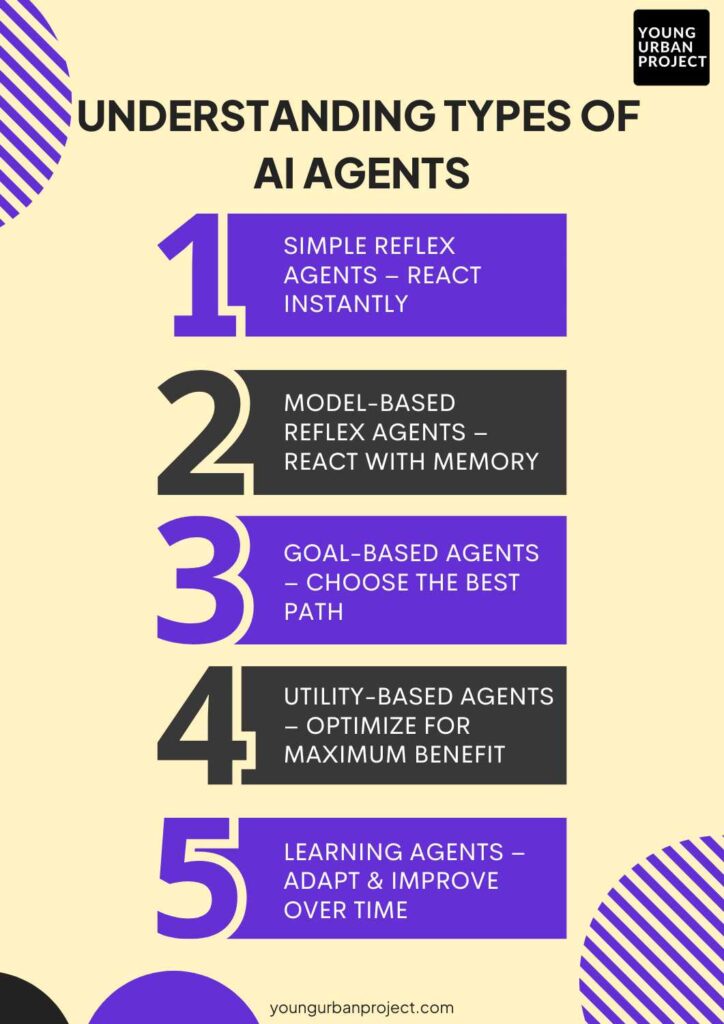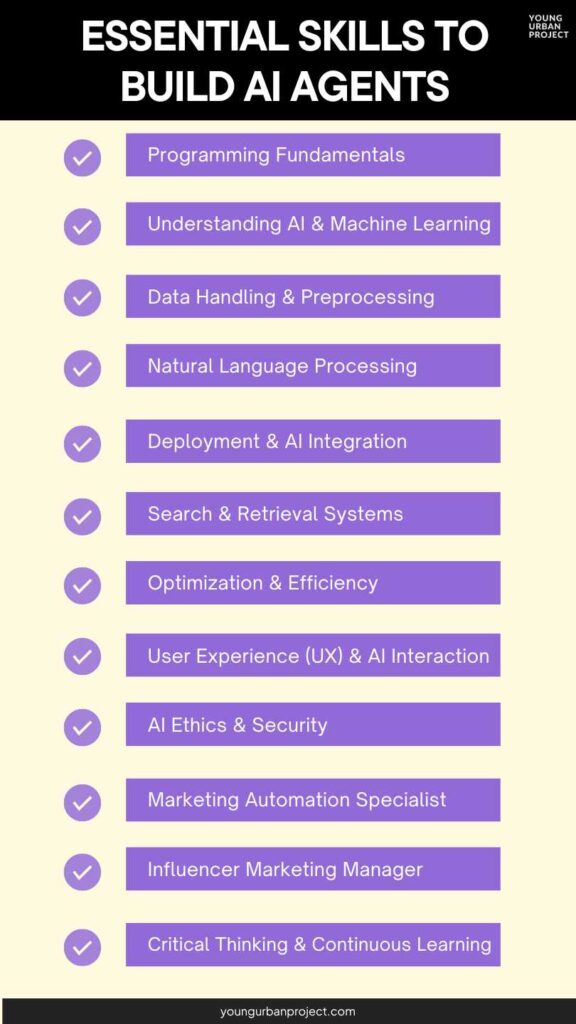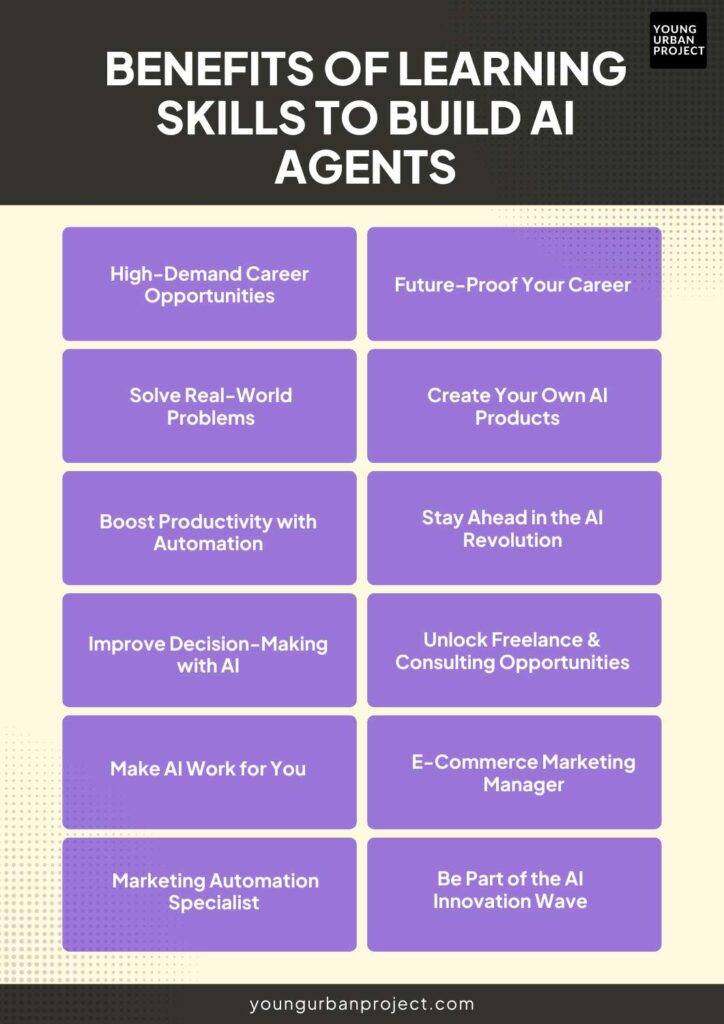You know that AI is everywhere, right? From chatbots answering your questions to self-driving cars making split-second decisions. But have you ever wondered what it takes to build these AI agents? If you’ve been curious about how they work and how you can create one yourself, you’re in the right place.
Table of Contents
Now, AI agents are the backbone of intelligent systems. They can process information, learn, and make decisions without human intervention. But here’s the catch: building one isn’t just about knowing how to code. It requires a mix of different skills, from understanding data to designing efficient algorithms.
So, let’s break down skills to build AI agent development and how you can start learning them today.
Understanding AI Agents: What Are They, Really?
AI agents are like smart digital assistants that can observe, analyze, and act based on what they see and learn. They don’t just follow fixed instructions—they can make decisions and solve problems on their own.
Some AI agents are simple and only react to direct input, while others are more advanced and can learn, predict, and adapt over time. Let’s explore the different types of AI agents and how they work using real-world examples.

1. Simple Reflex Agents – React Instantly
These agents follow predefined rules without learning from experience.
Example: Automatic Streetlights – They adjust the brightness depending on the traffic, weather, and the time of the day without considering past data.

2. Model-Based Reflex Agents – React With Memory
These agents build a basic understanding of their surroundings to make better decisions.
Example: Robot Vacuum Cleaner – It remembers obstacles and adjusts its cleaning path instead of bumping into furniture repeatedly.

3. Goal-Based Agents – Choose the Best Path
These agents analyze different actions and pick the best one to reach a goal.
Example: GPS Navigation – It calculates the fastest route by evaluating different paths and adjusting for traffic.

4. Utility-Based Agents – Optimize for Maximum Benefit
These agents don’t just aim for a goal—they evaluate trade-offs and pick the most beneficial action.
Example: Smart Air Conditioner – It balances comfort and energy cost, adjusting cooling based on electricity prices and room temperature.

5. Learning Agents – Adapt & Improve Over Time
These are the smartest AI agents, as they learn from experience and get better over time.
Example: Spotify’s Music Recommendations – It learns your taste by tracking what you play, skip, or repeat, refining your playlist suggestions.

Also read: What is Agentic AI?
Essential Skills to Build AI Agents
Building AI agents isn’t just about coding; it’s about understanding how AI thinks, learns, and interacts with the world. Whether you’re developing a chatbot, a recommendation system, or an autonomous AI assistant, mastering these fundamental skills will set you up for success.
Here’s a breakdown of the key skills you need, explained in simple terms.

1. Programming Fundamentals
AI agents run on code. So, learning programming is your first step.
- Python – The go-to language for AI development, thanks to libraries like TensorFlow, PyTorch, and scikit-learn.
- JavaScript – Useful for AI-powered web apps and chatbots.
- C++ – Ideal for high-speed AI applications (e.g., gaming, robotics).
- Version Control (Git, GitHub, GitLab) – Helps you track changes and collaborate with others.
Example: Just like a chef needs a good knife, an AI developer needs a strong grasp of Python to create smart algorithms.
2. Understanding AI & Machine Learning
AI agents process data, recognize patterns, and make decisions, this is where machine learning comes in.
✅ Machine Learning Basics
- How AI learns from data: Supervised, unsupervised, and reinforcement learning
- Common algorithms: Decision trees, neural networks, and support vector machines (SVMs)
✅ Deep Learning & Neural Networks
- Advanced AI techniques: CNNs for image recognition, RNNs for speech processing, and Transformers (like ChatGPT)
- Popular tools: TensorFlow, PyTorch, Keras
Example: Ever wonder how Netflix recommends movies? It analyzes what you’ve watched and predicts what you might like next—this is machine learning in action.
3. Data Handling & Preprocessing
AI agents thrive on data—but raw data is often messy and needs cleaning.
- Data Collection & Cleaning – Removing errors, handling missing values, and balancing datasets.
- Feature Engineering – Transforming raw data into useful inputs for AI models.
- Databases (SQL & NoSQL) – Storing and retrieving structured (SQL) and unstructured (NoSQL) data efficiently.
Example: Think of AI like a detective. If it gets incomplete or misleading clues (bad data), it won’t solve the case properly.
Also read: Generative AI vs Predictive AI: Key Differences
4. Natural Language Processing (NLP)
If you’re building an AI that interacts with humans, it needs to understand and generate language.
✅ Basic NLP Skills
- Tokenization, stemming, lemmatization (Breaking text into meaningful chunks)
- Named Entity Recognition (NER) (Understanding names, places, and dates)
✅ Advanced NLP Skills
- Word embeddings (Word2Vec, GloVe, FastText) (Helping AI understand meaning)
- Transformer models (BERT, GPT, T5) (Used in chatbots and virtual assistants)
Example: Your AI agent shouldn’t misunderstand a simple phrase like “I’m feeling blue.”—NLP helps it know that you mean “I’m sad,” not “I’m turning blue.”
5. Deployment & AI Integration
Building an AI agent is one thing—getting it to work for users is another.
- APIs & Backend Integration – Connecting AI models to websites, apps, or devices.
- Cloud Platforms – Hosting AI models on AWS, Google Cloud, or Azure.
- Containerization (Docker, Kubernetes) – Ensuring smooth deployment and scalability.
Example: Think of AI as a trained chef—it knows how to cook, but without a restaurant (deployment system), no one can enjoy the meals!
6. Search & Retrieval Systems
Some AI agents, like Google Search or ChatGPT, don’t create new information—they find and rank existing answers.
- Search Algorithms – TF-IDF, BM25 (for keyword-based ranking).
- Vector Search – Tools like FAISS, Pinecone, and Elasticsearch help AI match user queries with the best responses.
- Knowledge Graphs – AI-powered databases that connect related facts and concepts.
Example: When you Google “best places to visit in Paris,” the AI isn’t guessing—it’s ranking results based on past user behavior and relevance.
7. Optimization & Efficiency
AI agents should be fast, efficient, and accurate—this requires optimization techniques.
- Algorithm Optimization – Choosing the best models for speed vs. accuracy.
- Gradient Descent & Hyperparameter Tuning – Fine-tuning AI for better results.
- Hardware Acceleration (GPUs & TPUs) – Speeding up AI training.
Example: Imagine training an AI model is like cooking a meal—optimization ensures it’s ready faster without burning the food.
8. User Experience (UX) & AI Interaction
Your AI agent should be easy to use and interact with.
- Conversational Design – AI should respond like a human (not a robot).
- Voice Interfaces – Integrating AI with Alexa, Siri, or Google Assistant.
- User Testing & Feedback – Refining AI interactions based on real user behavior.
Example: A chatbot that keeps repeating answers is frustrating—good UX ensures users stay engaged.
9. AI Ethics & Security
AI must be trustworthy, this means reducing bias, improving privacy, and preventing misuse.
- Data Privacy – Protecting user data (GDPR, CCPA compliance).
- Bias Detection – Ensuring AI doesn’t discriminate.
- Transparency & Accountability – Making AI decisions explainable.
🛠 Example: AI in hiring shouldn’t favor certain applicants—ethical AI ensures fairness.
10. Critical Thinking & Continuous Learning
AI is always evolving, so developers must adapt, experiment, and keep learning.
- Problem-Solving – Debugging errors, improving performance, and handling unexpected issues.
- Collaboration – Working with engineers, designers, and business teams.
- Keeping Up With AI Trends – Following research papers, online courses, and AI news.
Example: AI today isn’t the same as AI five years ago—those who keep learning stay ahead.
Also read: Knowledge-Based Agents in AI: The Ultimate Guide
Benefits of Learning Skills to Build AI Agents
Mastering the skills to build AI agents opens up a world of opportunities. Whether you’re a developer, entrepreneur, or someone curious about AI, here’s why you should invest time in learning this:

1. High-Demand Career Opportunities
AI is transforming industries, and companies are actively looking for experts who can build AI-powered solutions. Learning these skills can land you roles like AI Engineer, Machine Learning Developer, or AI Product Manager—positions that offer high salaries and job security.
2. Future-Proof Your Career
Automation is replacing many jobs, but AI-related roles are booming. By learning AI agent development, you stay ahead of the curve and make yourself indispensable in the job market.
3. Solve Real-World Problems
AI agents can automate tasks, analyze data, and improve efficiency. With the right skills, you can build AI tools that solve everyday challenges, from automating customer support to optimizing business operations.
4. Create Your Own AI Products
Want to build your own AI startup? Learning to create AI agents allows you to develop innovative products, like virtual assistants, chatbots, or AI-driven analytics tools. Many entrepreneurs are leveraging AI to disrupt industries, why not you?
5. Boost Productivity with Automation
AI agents can handle repetitive tasks like scheduling meetings, managing emails, or analyzing customer data. By learning to build AI-powered assistants, you can automate work and increase efficiency in any field.
Also read: Main Goal of Generative AI
6. Stay Ahead in the AI Revolution
AI is evolving fast. The sooner you develop AI agent skills, the better you can adapt to new trends and use AI effectively in business, tech, or personal projects.
7. Improve Decision-Making with AI
AI agents can process vast amounts of data in seconds. Learning how they work enables you to make data-driven decisions, whether for business strategy, marketing, or finance.
8. Unlock Freelance & Consulting Opportunities
AI expertise isn’t just for full-time jobs. Many businesses seek AI consultants to develop custom AI agents. Freelancers with AI skills can charge premium rates and work on exciting projects.
9. Make AI Work for You
Instead of just using AI tools created by others, you can build custom AI solutions tailored to your needs, whether for automating your workflow, developing smart home assistants, or even creating AI-driven content tools.
10. Be Part of the AI Innovation Wave
AI is shaping the future, and those who know how to build AI agents will be at the forefront of this revolution. Instead of being a spectator, you can be a creator.
Also read: Rational Agents in AI: Working, Types and Examples
Conclusion
Right now, AI is shaping the way we work, interact, and even think. AI agents aren’t just futuristic concepts—they’re here, evolving rapidly, and becoming more integrated into daily life. The question is: Will you be a passive observer, or will you step up and build the future?
Mastering the skills to build AI agents isn’t just about coding or understanding algorithms. It’s about problem-solving, ethical responsibility, and creativity. It’s about asking, How can AI improve human lives? How can it drive businesses forward? And more importantly, What role will I play in this transformation?
If you’ve read this far, you already have the curiosity and ambition. Now, it’s time to turn that into action. Start learning, experimenting, and building. Because the future won’t wait, and the AI revolution needs builders like you.
FAQs
1. What programming languages do I need to learn to build AI agents?
If you’re serious about building AI agents, Python is your best bet. It’s easy to learn, has a ton of libraries (like TensorFlow, PyTorch, and Scikit-learn), and is widely used in AI development.
But Python isn’t the only option. Depending on what you want to build, you might also explore:
1. JavaScript – If you’re working on AI for web apps.
2. R – If you’re dealing with statistical computing and big data.
3. C++ – For performance-heavy applications like AI-powered games or robotics.
That said, don’t get stuck trying to master multiple languages at once. Start with Python, build a few small AI projects, and expand your skill set as needed.
2. Do I need to be good at math to build AI agents?
Not a genius, but you’ll need to understand some math concepts to really excel. The key areas include:
1. Linear Algebra – Helps with understanding how AI models process data.
2. Statistics & Probability – Essential for decision-making in AI.
3. Calculus – Mostly used in deep learning and optimization.
You don’t need a PhD in mathematics. You can learn these concepts on the go while building projects.
3. AI is changing so fast; how do I keep up?
AI is one of the fastest-moving fields, but staying updated isn’t as hard as it seems. Here’s how you can stay ahead:
1. Follow social media handles like Evolving AI, Artificial Intelligence Facts, The AI Page, etc.
2. Read AI blogs or news like OpenAI, Towards Data Science, and Google AI Blog.
3. Join AI communities on Reddit (r/ChatGPT) or Discord.
Instead of trying to learn everything, pick a niche that excites you—like AI for games, healthcare, or finance. Focus on that first!

